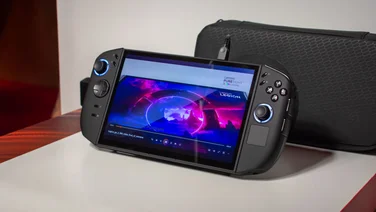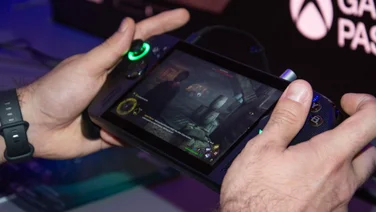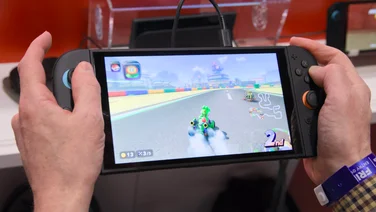To help us provide you with free impartial advice, we may earn a commission if you buy through links on our site. Learn more
- Google Stadia review: What you need to know
- Google Stadia review: Price and competition
- Google Stadia review: Where does Stadia fit in?
- Google Stadia review: Performance
- Google Stadia review: Controller
- Google Stadia review: Over-promised but under delivered?
- Google Stadia review: Game selection
- Google Stadia review: Verdict




















- Streams games at up to 4K
- Compatible with a variety of platforms
- Smooth performance
- You have to pay extra for games
- Little control over graphics settings
Deal alert: Get Stadia for free when you buy BT Broadband
While Stadia is going for £119 at the Google Store, you'll find you can pick it up for free if you buy one of BT's broadband services. Gaming fans may well find this reason enough to leave their current provider and defect to BT – simply click on the link below to be taken to the company's broadband page, where you can see what services are available in your area. Packages start at £28 per month.
BT
Is the games console era drawing to a close? Google (and others) would certainly like you to think so, ushering in a replacement in the form of Google Stadia, which allows you to stream console-quality games over the internet.
There’s no chunky box sitting under your telly, the games are no more expensive than they are in the consoles’ download stores and you can play from any computer via the Chrome web browser, as well as on your TV and a select few Pixel smartphones.
What’s not to like? Well, there certainly are one or two notable pitfalls but Google has certainly made an impressive start in persuading gamers to part with their PlayStations and Xboxes.




















Google Stadia review: What you need to know
If you want to get your hands on Google Stadia right now, you’ll have to order the £119 Stadia Premier Edition package. This comprises the Stadia controller, a Chromecast Ultra to plug into your TV and a three-month subscription to Stadia Pro (normally £8.99 per month), the Stadia equivalent of Xbox Live Gold or PlayStation Plus.
Stadia Pro allows you to stream games at up to 4K and 60fps (frames per second), although that’s a heavily caveated claim, I’ll address below. It also has support for 5.1 surround sound and promises to give subscribers access to regular free games, including Destiny 2: The Collection at launch.
If you can hold out until early next year, the free Stadia Base service will be released. This doesn’t come with any hardware and only supports resolutions of up to 1080p at 60fps and limits audio to stereo sound. Obviously, you’ll have to purchase the controller and Chromecast Ultra to play on a TV.




















Google Stadia review: Price and competition
Although Google Stadia is a direct rival to the big two console makers, they’re not about to let Google steal their lunch money without a fight.
Sony has already launched its own streaming service, PlayStation Now, which costs as little as £4.17 per month if you’re prepared to pay for a year up front. Crucially, it includes unlimited access to a huge library of games including GTA V, God of War and Uncharted 4, as opposed to Google’s model where you pay for the games in addition to your Stadia Pro subscription. That said, games come and go from PlayStation Now (GTA V leaves in early January 2020, for example) whereas your Stadia game purchases should remain available for the lifetime of the service.
Microsoft is also trialling its own streaming service, Xbox Game Streaming. As with PlayStation Now and Stadia, it can stream to either PC or console, and there will be support for mobile devices too. Microsoft is yet to announce a price for the service, which is in public beta.
Finally, it’s also worth considering standalone streaming services such as Shadow, which basically streams a gaming-spec Windows PC to any device. Unlike the others, this allows you to take your pick of any Windows-compatible game, including any you may have already purchased in your Steam library. The cheapest Shadow package includes Full HD streaming, with the equivalent of an Nvidia GTX 1080 graphics card, quad-core 3.4GHz processor and 256GB of storage for £14.99 per month. More expensive, higher-spec Shadow subscriptions are available.




















Google Stadia review: Where does Stadia fit in?
Before we dive into the pros and cons of Stadia, it’s worth considering where this service fits into the market. At first blush, you might compare Stadia to PlayStation Now and consider it an utter rip-off: a £120 upfront hardware cost and £9 per month for Stadia Pro, compared to as little as £4 per month for PlayStation Now.
But Stadia is undoubtedly the more flexible, high-powered service. For starters, the maximum resolution on PlayStation Now is a crummy 720p, with no support for surround sound, compared to Stadia’s 4K and 5.1.
And while the limited selection of Stadia games at launch are mainly console orientated – such as Red Dead Redemption II, Assassin’s Creed Odyssey, Metro Exodus – it also supports traditional PC, keyboard-and-mouse titles such as Football Manager 2020, which you won’t find on Sony or Microsoft’s services.
So, yes, while Stadia is undoubtedly expensive (at least until the free Base tier arrives), it’s much more powerful and has the potential to deliver the best of both console and PC gaming in one.




















Google Stadia review: Performance
So, let’s cut to the chase and talk about performance. How smooth is the games streaming? In short: impressively slick.
On my test Full HD TV, with the Chromecast connected on the 5GHz band to a bog-standard BT Smart Hub in the same room, I’ve barely seen a stutter. Any kind of frame drop or lag in games such as Destiny 2 would be disastrous, but – honestly – in the 20 hours or so I’ve spent streaming on Stadia so far, I could barely tell the difference between Stadia and playing on a local console or PC. It’s that smooth.
The experience dips a little when playing via the Chrome browser on a laptop two brick walls away from the router. Here I’ve seen stuttering as the 5GHz Wi-Fi struggles to maintain a solid signal but, in general, it’s remarkably smooth, even at the higher resolution of 2,560 x 1,440.
The harshest criticism of Stadia has come from those playing on 4K screens, with complaints that details levels suffer. While it’s certainly true that games such as Red Dead Redemption do lose a bit of detail and texture in the grass, the clouds and the reflections compared to a high-end console running at full graphical quality, you would have to be deliberately looking for it. I found myself so caught up in the game, which continued to run smoothly at 4K by the way, that the odd dropped frame or blurred bit of scenery didn’t really register.
The ability to play 4K at all very much hangs on having a broadband connection fast enough to be rated as “great” and ready for “Best Visual Quality” by Google’s Stadia speed checker (projectstream.google.com/speedtest). For reference, we were using an 80Mbits/sec BT Broadband fibre line, which had a measured speed of 63Mbits/sec in Google’s speedchecker.
If not, you’ll drop down to the 1080p feed, and as this excellent video from Digital Foundry shows (see below), you will see a significant drop-off in visual quality and textures. However, the best quality feed is comparable with local PC and Xbox One X performance, with almost no discernible difference in input lag (the time it takes for a button press to register in-game), either. In fact, Stadia is better than Xbox One X in this regard.
Note, that even though Stadia Pro promises 4K at 60fps, some games (Red Dead Redemption II, for instance) are limited to 30fps. In fact, it’s a challenge to find any game on Stadia currently running at both maximum resolution and frame rate.
At 1080p Red Dead can run at 60fps but often dips below that frame rate in busy scenes. The fact you have little or no control over which quality and frame rate games are displayed at may frustrate hardcore gamers but it seems Google makes largely sensible choices to prioritise the smoothness of the gaming experience.
Stadia delivers the smoothest performance when you use wired rather than wireless connections to your router. An Ethernet port built into the Chromecast Ultra charger makes that possible if you’re streaming to a TV, although that obviously depends on the router and TV being in the same room. Also note, if your Wi-Fi or broadband connection drops, you have 15 minutes to resume gaming from where you left off, or else all unsaved progress is lost.




















Google is pretty tight-lipped on what “specification” of hardware you get with Stadia but Football Manager 2020 listed access to 127 processor threads! Sports Interactive tells me that’s a bug and Stadia only gives you access to eight but performance in data-crunching games such as FM20 is very strong. If you start in England and run all the recommended (nine) international leagues with a large database of players (41,000), you get an estimated game speed of 4 stars, which is fast.
You’d need a high-end PC to match that kind of performance. Oddly, Football Manager’s 3D match engine does stutter on Stadia, but it does on high-end PCs we’ve played on too, suggesting that’s more of a game issue than one with Stadia.
One final word on performance: games are available and ready to play from the moment the purchase is confirmed. There’s no wait to download or install games, or 20-minute waits for the game to apply 50GB updates as you’ll often experience on consoles. It’s ready to go right away, which removes one of the big frustrations of modern gaming, and game load times are no worse than what they are on the latest consoles.
Google Stadia review: Controller
The Stadia controller will feel familiar in the hand to anyone who’s used to Xbox and PlayStation controller. It’s less chunky than the Xbox controller and, like the PlayStation equivalent, it has the two analogue sticks parallel with one another, rather than one high, one low, as on the Xbox controller. That can take a little getting used to if you’re used to Microsoft’s console, but it’s by no means a showstopper.
The controller has a built-in, non-removable rechargeable battery. Our early tests suggest that will see you through 10 to 15 hours of gameplay and it takes a little short of five hours to fully recharge. The charger is supplied in the box. There’s a 3.5mm socket for plugging in a headset, but there’s no support for Bluetooth headsets as yet.




















If you’re playing on a computer, you can plug in the Stadia controller via USB. However, Stadia also supports other PC-compatible controllers, such as the Xbox One controller, perfectly. The visual prompts to press certain keys in Red Dead Redemption II even acknowledge there’s an Xbox rather than a Stadia controller plugged in, so there’s no confusion.
If you already have a controller, when the Base tier arrives next year the cost of entry will be effectively zero – although you’ll still have to buy your games from Google.
Google Stadia review: Over-promised but under delivered?
If there’s one big criticism we have of Stadia – aside from the fiasco that saw people who pre-ordered six months ago still waiting for access codes days after its release – it’s that Google over-promised on features that have yet to arrive.
For example, there’s a button on the controller to activate Google’s voice assistant, but the service is not yet active at the time of writing. Demo videos showed gamers watching a YouTube ad for games and being able to jump straight in with Stadia, but we’re yet to see any evidence of that. And the features that let people watch streams of your game and instantly join the action, or enable you able to see friends’ screens while you’re playing, are likewise missing.




















Features such as these made Stadia stand out as something different; a unique gaming platform. What Google has delivered at the present time is a relatively standard game streaming service.
Google Stadia review: Game selection
The launch library of games is also thin. There’s a respectable share of big hitters – Red Dead, Assassin’s Creed and a handful of Tomb Raider titles – but there’s nothing standout.
Google’s also being a wee bit cheeky with the listings of Stadia games on its website. Despite listing more than 40 titles, only 22 are actually available at the time of writing. Titles such as Baldur’s Gate 3, Borderlands 3 and Gods & Monsters are yet to appear.
With a limited audience, it’s going to be hard to tempt a major developer to hand Stadia a big exclusive, which may mean waiting for Google to deliver its own in-house games before we see something unique on Stadia.
Google Stadia review: Verdict
Despite the limited games library, despite the undelivered features, despite the relatively stiff pricing, what Google has pulled off so far is still impressive.
On a fast fibre connection, Stadia’s performance is slick: the best we’ve seen from any streaming service to date. Yes, native PC and console games may offer greater, sharper detail, but in isolation you won’t be disappointed with the visual splendour or smoothness of Stadia-hosted games.
Better still, it just works. Choose your game, fire up TV, browser or selected mobile device, and it’s game on. It makes you wonder why we ever accepted half hour waits for console updates in the first place. This is gaming how it should be: fun from the moment you turn it on until the second you switch it off.
With the promise of plenty more to come, we’re giving Stadia a tentative thumbs up.







